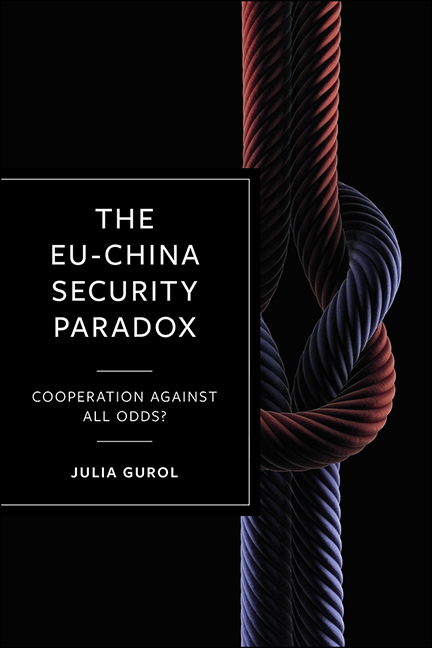Book contents
- Frontmatter
- Contents
- List of Figures
- List of Tables
- List of Abbreviations
- About the Author
- Acknowledgements
- 1 The EU and China in a Changing International Environment
- 2 Analytical Framework: Towards Multidimensionality
- 3 The EU’s and China’s Foreign and Security Policy Principles
- 4 The EU and China on the Global Stage: Interests and Interdependence
- 5 Framing and Perceptions in EU–China Security Relations
- 6 EU–China Relations on Anti-Terrorism
- 7 EU–China Relations on Maritime Security and Anti-Piracy
- 8 EU–China Relations on Climate and Energy Security
- 9 The US: An Elephant in the Room for EU–China Security Relations
- 10 Conclusion and Outlook: The EU and China at a Crossroads
- Notes
- References
- Index
8 - EU–China Relations on Climate and Energy Security
Published online by Cambridge University Press: 15 September 2022
- Frontmatter
- Contents
- List of Figures
- List of Tables
- List of Abbreviations
- About the Author
- Acknowledgements
- 1 The EU and China in a Changing International Environment
- 2 Analytical Framework: Towards Multidimensionality
- 3 The EU’s and China’s Foreign and Security Policy Principles
- 4 The EU and China on the Global Stage: Interests and Interdependence
- 5 Framing and Perceptions in EU–China Security Relations
- 6 EU–China Relations on Anti-Terrorism
- 7 EU–China Relations on Maritime Security and Anti-Piracy
- 8 EU–China Relations on Climate and Energy Security
- 9 The US: An Elephant in the Room for EU–China Security Relations
- 10 Conclusion and Outlook: The EU and China at a Crossroads
- Notes
- References
- Index
Summary
Introduction
While climate security implies that climate-related alterations create risks in society that endanger the security of human beings, ecosystems, the economy and infrastructure, energy security is the association between the availability of energy resources of all kinds and national security. It entails topics like diversification of oil and gas supplies, offshore oil and gas safety, and critical infrastructure (European Commission, 2019b). While there has been a considerable amount of scholarly work on the politics of climate change and energy security as separate issues (Toke and Vezirgiannidou, 2013), sometimes measures to ensure climate security can contradict initiatives to ensure energy security (Chalvatzis and Hooper, 2009). Other scholars argue that both can be achieved through similar policies (Brown and Huntington, 2008). Climate security and energy security are both global concerns and energy accounts for around 60 per cent of emissions globally. Thus, the two issues are closely related. Another reason, why climate and energy security are examined together in this book is that in China, the two are inseparably linked (Wu et al, 2012; IEA, 2019). Moreover, both issues feature prominently on the agenda of EU–China relations (Holzer and Zhang, 2008). Due to their strong dependence on fossil fuel supplies, the EU and China are vulnerable to energy security problems, and the large carbon footprint of their energy sectors is a climate concern (Espa, 2018).
Furthermore, China is the largest and the EU is the third-largest emitter of carbon dioxide (CO2), together accounting for around one-third of all energy-related CO2 emissions worldwide (IEA, 2015; European Commission, 2016b). China has been the world's largest energy consumer since 2011 and is projected to account for 22 per cent of global energy consumption by 2040, according to the BP Energy Outlook (BP Energy Economics, 2019). In addition, China became the world's largest emitter of greenhouse gases (GHG) in 2006, surpassing the US (Schreurs, 2016). By 2014, it accounted for about 29.7 per cent of global CO2 emissions (Torney and Gippner, 2018). According to the country's latest carbon ‘inventory’ submitted to the UN in 2019, China's GHG emissions hit 12.3 billion tonnes in 2014, rising by around 53.5 per cent in just a decade (CNBC, 2019).
- Type
- Chapter
- Information
- The EU-China Security ParadoxCooperation against All Odds?, pp. 116 - 136Publisher: Bristol University PressPrint publication year: 2022



